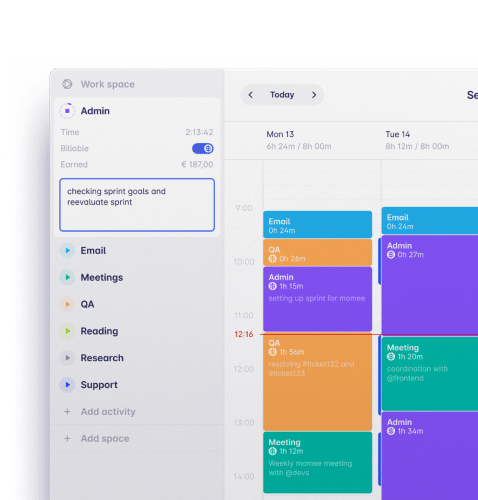How Does Teamwork Affect Productivity?
If you want to go fast, go alone; if you want to go far, go together
African proverb
Many voices advocate the positive effects of teamwork at school, at home, and at work. But does it hold? Are we more productive when we work collectively? Recent data shows that organizations that promote teamwork innovate more, find mistakes more quickly, and attain higher productivity.

Maximize your team’s productivity with a time tracking solution
In this article, we’ll demystify how and why teamwork affects the productivity and performance of an organization, especially in today’s fast-paced environment.
We hope that by the end of this reading, you can draw meaningful conclusions that will help you and your team solve problems faster and get better results.

How does teamwork affect productivity?
To find out the answer to this question, we first need to understand what teamwork is. Teamwork is working together with other people towards a common goal.
Most organizations, especially larger ones, are divided into several teams in which each employee performs a role.
When you work as a team, you and your team members are like pieces of a big puzzle, which only make sense when they’re together. However, although it seems simple, working in a team is not easy. It takes time, patience, understanding, and, above all, excellent communication skills.
Teamwork is much more than dividing tasks and working individually to complete the job faster.
A successful team understands that working together on a project is more effective than working alone because each person is a piece of the puzzle that gives a unique contribution.
Building a high-performing team may not be easy, but it’s worth it, and that’s what we’ll show you next.

Looking for the most effortless and accurate time tracking tool for your team?

Teamwork increases productivity
In broad terms, productivity is the measure of how well a person completes a specific task. Well, when several team members put their unique skills together, most of the time, the work gets done faster and with higher quality than one person alone could. Given the definition of productivity, teamwork should indeed increase productivity.
Read also: How to track time together with your team
Over the last few years — and as the obsession for productivity and performance increases — many studies have been done to determine whether or not teamwork increases productivity. Most of them have shown that it does. A study showed a significant positive impact of collaboration on organizational performance.
Firstly, working as a team minimizes workloads for all employees. Also, by sharing ideas and responsibilities, teamwork helps reduce stress, allowing your teammates to be meticulous and thorough when completing tasks. Additionally, working as a team allows for more ideas, increasing the likelihood of coming up with creative solutions.
So when it comes to getting work done, two heads are better than one. However, that may only sometimes be the case. A recent study showed the relationship between teamwork and productivity depends on the complexity of the tasks. Researchers found that while individuals best accomplish simple tasks, difficult ones are more efficiently completed by a group. Interesting, right? Let’s now dive deeper into why teamwork benefits productivity.
Discover the differences between efficiency and productivity.
Teamwork promotes alignment
Imagine you’re on a rowing boat. If each crew member rows in the opposite direction, the ship will not move and eventually sink. If everyone rows in the same order, they will reach port quickly.
This metaphor shows the importance of team alignment. Alignment exists when all team members work towards the same vision and goals. When everyone is clear on the common goal and how each one should contribute, the probability of success is much higher.
This study showed that companies that are closely aligned grow revenue 58% faster and are 72% more profitable, outperforming their competitors who are not aligned. If you think that revenue and profit are the same, please read our article revenue vs profit to discover the differences and their impact on a business.
Besides promoting focus on the work that needs to be done, having a shared vision can also help create team unity. And as we already know, a good team environment has numerous benefits, including excellent employee performance.

Teamwork fosters collaboration
Earlier, we mentioned that one of the reasons why teamwork increases productivity is due to workload sharing. However, we refer to more than just sharing the amount of work. Collaboration between teammates is one of the most significant advantages of teamwork.
In soccer, teams that pass the ball between players are more likely to score goals than those with individualistic players.
The same happens in teams with common goals. Collaboration allows people to share experiences, ideas, and skills. By uniting the unique abilities of each team member, teams can achieve better results for the company.

Free eBook: How to plan your team’s time?
Get your free copy and discover how to leverage the power of time tracking in your team.
Read our guide and learn how to improve team communication.
Teamwork encourages learning
Usually, every team is made up of people with different skills, levels of experience, and characteristics. Each team member is the go-to person in their respective area because of their level of expertise.
Working together towards a common goal can teach the other something. This cooperation is an excellent opportunity for new employees to learn from the more experienced ones.
On the other hand, the younger employees can also teach the older ones new techniques and challenge them by bringing in innovative, out-of-the-box ideas.
This pooling of knowledge contributes to the increased productivity of teams. Not only this, studies have shown that diverse groups are more creative and perform better by up to 35% compared to non-diverse units.
Teamwork is great for performance
You build relationships with your teammates over time when you work as a team. You don’t need to become best friends with your work colleagues; many people like to keep work and personal life separate. However, you must have a relationship of communication and trust with your co-workers and strive for a good atmosphere within the team.
A positive workplace is more successful because it enhances employees’ positive emotions and well-being. On the other hand, when they’re in a safe environment, employees feel more confident to come up with creative ideas and ask for help. A good team environment also helps combat stress, a proven enemy of productivity.
Read also: How to track team performance
Conclusion
Working in a team is not for big egos. It takes a lot of understanding, communication, and the ability to cooperate. However, everyone stands to gain.
Teamwork takes you further and allows you to dream bigger and get there faster. In today’s job market, being a team player is a trait in high demand. One of the big reasons is the proven results of successful teamwork.
This article showed us that teamwork helps you achieve more significant productivity thanks to various factors such as workload sharing, peer support, and overall motivation. Working in a team also promotes learning opportunities and collaboration, the advantages of which are apparent. So, what are you waiting for to build your team and increase productivity?
FAQ
Multitasking decreases employees’ productivity. Despite being seen as an essential skill, recent research has shown that multitasking while working has concerning consequences: productivity can drop by up to 40%.
Studies show that teamwork positively impacts productivity thanks to workload, responsibility sharing, and stress reduction. Additionally, working as a team gives room for more ideas, increasing the likelihood of coming up with creative solutions.
Studies show that teamwork positively impacts productivity thanks to workload, responsibility sharing, and stress reduction. Additionally, working as a team gives room for more ideas, increasing the likelihood of coming up with creative solutions.
Remote working increases productivity as well as clear benefits for workers on a personal level. Happy workers have higher productivity rates, are better teammates, and tend to stay longer in companies that allow remote working.
If you want to inspire your employees, you should have a very transparent approach to their performance and results. Set realistic goals, give regular, constructive feedback, and promote a culture of healthy communication. Read our article to learn how to keep your team motivated to be productive.
You might be interested in the following: